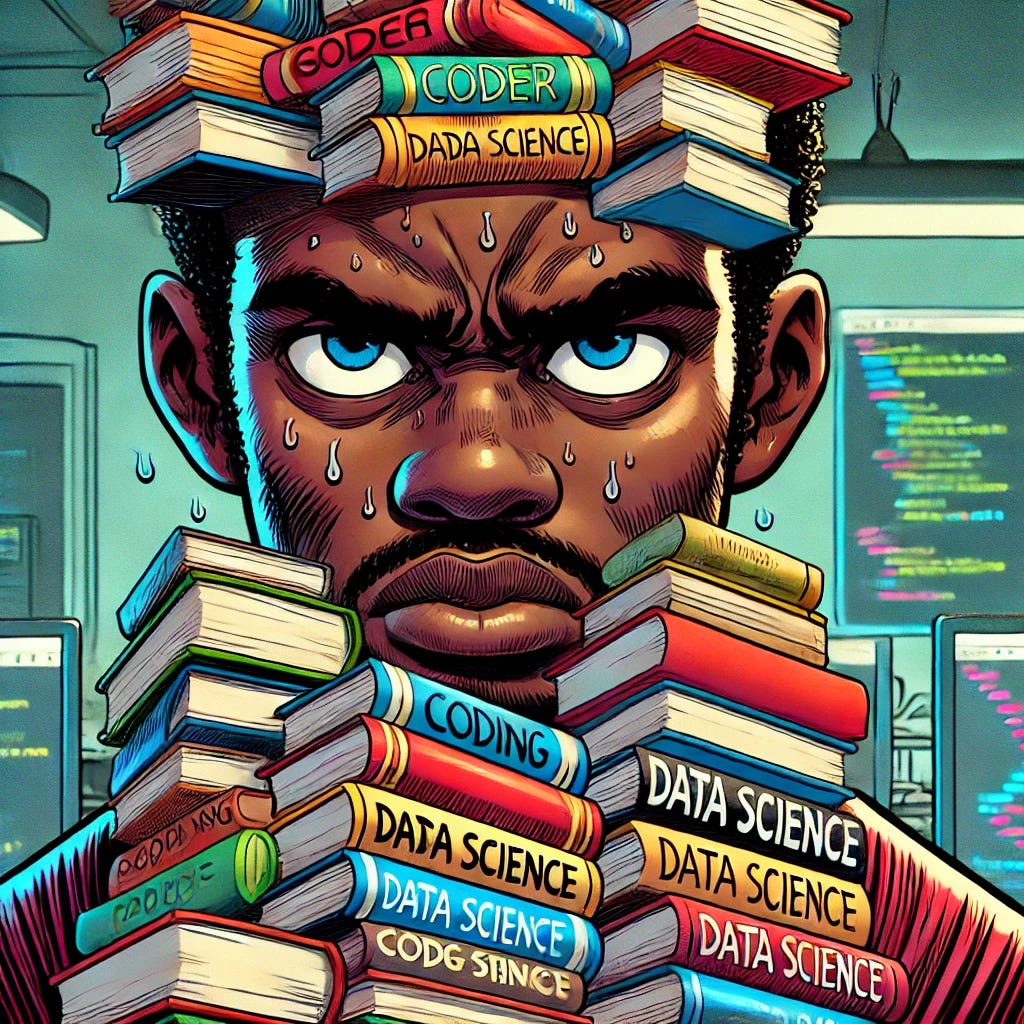I just deleted every Python tutorial from my bookmarks.
All 47 of them.
Over the last two years, every semi-interesting concept I had bookmarked thinking
"If i watch this later, it could change my career."
Of course they didn't (I didn't even watch most of them). It was just another example of being stuck in tutorial hell.
Tutorial hell isn't about watching too many courses. It's about confusing motion with progress. We need to break things, and build real things - that's the only way out.
For years, I hoarded these tutorials like a squirrel preparing for winter. "I'll watch them when I'm ready," I told myself. "Just one more before I start building."
Sound familiar?
Why We Get Stuck
Here's what I've realised about tutorial hell: It's comfortable. It's safe. Every video makes us feel like we're progressing.
But we're not.
We're just getting better at watching other people code.
I learned this the hard way when I got my first job and the first few months were tough. Not because I lacked knowledge - I had watched countless tutorials on the exact tools I needed.
I crashed because I had never felt the pain of debugging a real-world project at 2 AM.
The Painful Truth
Real growth in data science isn't measured in tutorials completed.
It's measured in:
- Hours spent staring at error messages
- Stack Overflow tabs opened
- Git repositories that started clean and ended chaotic
- Projects that made you question your career choice
- Number of times you've asked ChatGPT to explain a concept to you. Then simplify it. Then simplify it again.
These aren't signs of failure. They're the building blocks of actual competence.
The Mastery Mirage
Here's what nobody tells you about tutorials:
Mastery isn't built in tutorials - it's built in the gaps between them. Projects aren't for showing what you've learned - they're for discovering what you need to learn.
Think about the last tutorial you completed. You understood everything, right? The code made sense. The concepts clicked.
But when you tried to build something similar on your own?
Chaos.
That's not failure. That's the gap where real learning happens.
Learn until sufficient, build until expert. Every hour spent in tutorials beyond 'good enough' is an hour stolen from real mastery.
Breaking Free
You know what finally forced me out of tutorial hell?
Building projects at the intersection of my interests and what the job market demands.
I've taken an even bigger leap into the world of business as my friend Alex (who you may have seen on the channel) and I are currently building a SaaS 'company' based on data science. (I mean, are you even really a programmer if you haven't convinced your friend to build "the next big thing" with you?)
We're building data science software that I would've been terrified to attempt six months ago. The code isn't perfect. Our git history is... questionable. But we're building. Actually building.
And you know what? Every time we break something (which is often), I learn more than I did from all those carefully bookmarked tutorials.
The Growth Path
Tutorial addiction isn't about learning - it's about avoiding the discomfort of real growth. Break the cycle: build something that scares you.
Stop treating tutorials like a undeniable checklist. Start treating them like what they are- a starting point to your exploration.
1. Start that project you're "not ready" for
2. Break it spectacularly
3. Only then, use tutorials to fix specific problems
4. Repeat until it works
Every impressive GitHub profile you admire started with broken code.
Every elegant solution began as a hacky mess.
Every confident data scientist was once an anxious beginner.
The difference? They chose discomfort over tutorials.
The tutorials will always be there. Your time won't be.
Leave a comment: What's the messiest project you've built that actually taught you something valuable?
Your data science buddy,
Nash Jay M
P.S. Share your project disasters on Instagram. Let's make tutorial hell a little less lonely.





Thank you for this write up. Indeed, data related work is very attractive, especially when one comes across it on YouTube.
Real life is tough though. Ones analytical mind should always be 'on', fingers should be nimble and type out SQL queries fast, domain knowledge should be at the finger tips and dashboards should never crash.
These are the hidden struggles we don't discuss often enough. The high expectations, steep learning curve, the burnout and imposter syndrome are just the tip of the ice berg for some.
I only know R but after taking a course on databases, I decided to build a database using football performance data scraped from sites. I knew no word in Python, hadn't even taken a tutorial on it, or written 'hello world'.
But I'd already decided to learn it in the future and to learn it from a project-based approach.
I'm currently collecting the data and would soon start modelling the database and creating relationships between the various tables that'd be in the database. But each step has come with problems, and each problem has led to me learning something new.
So yeah, the problems have actually been my best teachers.